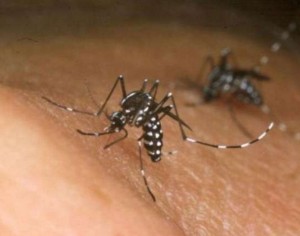
First Zika vaccine breakthrough from India



Bharat Biotech an Indian biotech company has come up with full-fledged vaccine for Zika virus, and filed for global patents for its two Zika Vaccines.
India’s globally significant ‘Zika biotech moment for India’ as the country is celebrating the 30th anniversary of setting up of the Department of Biotechnology (DBT) began in 1986 under then Prime Minister Rajiv Gandhi.
Bharat Biotech International Limited develops the Zika virus vaccine, in Hyderabad south India. The story of the Zika virus vaccine breakthrough actually beings in 1996 with the tale of a middle class Tamilian farmer’s son Krishna Ella, trained to be a molecular biologist at the University of Wisconsin-Madison, USA, deciding to go back to India.
Bio-tech scientist, Krishna Ella, is the chairman and managing director of Bharat Biotech was influenced by his mother who said “Son, you only have 9 inch stomach and how much more money you make you can’t eat more than that. You come back and do whenever you want, I will see to it that you get food as long as I am alive, you will not starve.”
The startups were not easy as the US$ 100 million company was set up to create specialised Vaccine production plants. The privately held company, which has received funding from the Bill and Melinda Gates Foundation in the past for research, is developing a recombinant vaccine and an inactivated vaccine. A recombinant vaccine is created by genetic engineering-the inactivated vaccine kills the disease-causing microbe to stop its replication.
The Zika virus is rapidly spreading in Brazil, and on 2nd January in Puerto Rico and on 14th January the virus was found in US state of Texas after a woman returned from travelling in Honduras. prompting the World Health Organisation to declare a global emergency. No known approved vaccine has been developed for the virus as yet, while leading drug manufacturers like Japan’s Takeda and France’s Sanofi are looking into all possibilities.
Having mastered the making of the world’s cheapest hepatitis-B vaccine and the bulk supply of the oral polio vaccine of which according to Ella, his company has supplied 3.5 billion doses among several other vaccines. Ella’s company also was in joint venture with Indian government to make the first ever Indian-made vaccine called ‘Rotavac’, a vaccine against an infectious diarrhea disease including Delhi belly, inflicted by Rota virus.
Ella also said lot of research and development led him to start developing vaccines against Japanese Encephalitis (JE) and Chikugunya, both mosquito borne viral diseases. Chikugunya the bone breaking fever first emerged India in 2006 from Africa. Zika virus was originally isolated in a rhesus monkey, from Ugandan forest in 1947 – showing its head again since the mosquito that transmits the virus is the same that carries in its lethal bite the Chikugunya, JE and dengue viruses. Within 10 years, Zika emerged in Nigeria and in 2007 on the small Micronesian island of Yap in the South Pacific and in 2013, 180 people were infected with the virus in French Polynesia. In May 2015, the virus was first discovered in Brazil and around 3,500 suspected cased of microcephaly have been identified.
According to Ella, 18 months ago his research group headed by Dr. Sumathy initiated a gentle paced work on making vaccine against the infectious Zika virus. Although India had no live specimens of the virus, they had to import it through official channels and in the process of developing a ‘vaccine for travellers’ in a single dose that would give immunity against Zika, Chikugunya and JE.
The Zika Virus vaccine called “Zikavac” is ready for pre-clinical trials which will be examined from the scientific point of view by World Health Organisation. Developing the necessary molecules that constitute the vaccine at the ‘Genome Valley of Hyderabad’, is submitted to the Indian Council of Medical Research (ICMR) for approval.
India is the first country in the world that set up a separate Department of Biotechnology to nuture this sector 30 years ago on a shoestring budget.
Zika virus is difficult to detect, as only one in five people with the virus actually go on to become ill. It is very similar to Dengue fever, so misdiagnosis is huge problem. The symptoms are hot temperature, rash and muscle pain and among pregnant woman the pre-natal birth defects as the virus has been linked with microcephaly where in the head does not develop to the size that it should. The announcement of the link was made on 28th November 2015, following an autopsy on a baby born with microcephaly showed the presence of Zika virus. Pregnant women have since been advised not to travel to countries affected by Zika virus. A UK firm has produced a genetically modified mosquito that can stop Aedes mosquito offspring from reaching adulthood and thereby preventing them from reproducing and spreading the virus.
